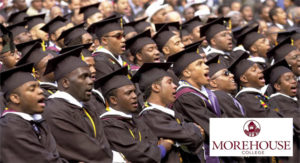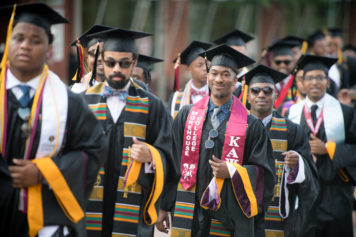
“That’s a historic number,” says Kinnis Gosha, assistant professor of computer science at Morehouse. “This is counting every single Black male from every school in the nation. Of all of those African-American Ph.D. male students, 13 percent are coming from Morehouse, from this lab.”
Gosha is also the director of the Culturally Relevant Computing Lab at the College.
“Morehouse literally is changing the computer science field in terms of diversity with those types of numbers,” he says.
A computer science degree graduate has a promising myriad of career options. Of course, the higher the experience, the higher the pay grade. Career choices include software system developer, computer science analyst, and business intelligence analyst. In a field where diversity is poorly represented, the need for Black computer science graduates, male and female, can herald significant contribution to the Black community.
A recent Taulbee Survey found that only 17 people who identified themselves as Black or African-American earned doctorates in computer science. Two received doctorates in computer engineering and eight in information.
“[These numbers are] important because of this nation’s need to produce a STEM workforce,” Gosha says.
STEM stands for Science, Technology, Engineering and Mathematics. In the past, these four academic disciplines have been primarily studied by only whites and Asians.
“That’s where an overwhelming number of jobs are going,” Gosha says. “We need people with this skill set or we will have this nation bringing in people from [other countries].”
Gosha, who earned his Ph.D. in human-centered computer science from Clemson University in 2013, created the Culturally Relevant Computing Lab four years ago. He is a STARS Computing Corps alumnus, having participated in the Corps while earning a master’s in computing science at Auburn University.
STARS (Students in Technology, Academia, Research and Service) Computing Corps is a not-for-profit organization that builds and prepares a more diverse computing workforce. In a popular project from STARS, students use culturally relevant avatars in a web application created to address bullying in K-12 schools. BullyShutdown allows students, as well as teachers and administrators, to experience common bullying scenarios through conversations with avatars.
“Instead of having to undergo intervention after having been bullied or caught bullying, this training allows everyone to work though the interaction before bullying occurs,” Gosha explains. “If you train the students, you can reduce the amount of bullying that’s happening.”
This August, four more of his students entered doctoral programs in computer science: Robertson Bassy at Auburn University, Jassiem Ifill and John Angel at Rensselaer Polytechnic Institute, and Zaire Ali at the University of North Carolina-Charlotte.
According to the National Math and Science Initiative, STEM job creation over the next 10 years will outpace non-STEM jobs significantly, growing 17 percent, compared to 9.8 percent for non-STEM positions.


